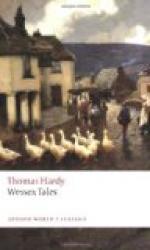The voice seemed to proceed from the belly of the cow called Cherry, but the speaker was a milking-woman, whose face was buried in the flank of that motionless beast.
‘Hav’ anybody seen her?’ said another.
There was a negative response from the first. ’Though they say she’s a rosy-cheeked, tisty-tosty little body enough,’ she added; and as the milkmaid spoke she turned her face so that she could glance past her cow’s tail to the other side of the barton, where a thin, fading woman of thirty milked somewhat apart from the rest.
‘Years younger than he, they say,’ continued the second, with also a glance of reflectiveness in the same direction.
‘How old do you call him, then?’
‘Thirty or so.’
‘More like forty,’ broke in an old milkman near, in a long white pinafore or ‘wropper,’ and with the brim of his hat tied down, so that he looked like a woman. ’’A was born before our Great Weir was builded, and I hadn’t man’s wages when I laved water there.’
The discussion waxed so warm that the purr of the milk-streams became jerky, till a voice from another cow’s belly cried with authority, ’Now then, what the Turk do it matter to us about Farmer Lodge’s age, or Farmer Lodge’s new mis’ess? I shall have to pay him nine pound a year for the rent of every one of these milchers, whatever his age or hers. Get on with your work, or ’twill be dark afore we have done. The evening is pinking in a’ready.’ This speaker was the dairyman himself; by whom the milkmaids and men were employed.
Nothing more was said publicly about Farmer Lodge’s wedding, but the first woman murmured under her cow to her next neighbour, ’’Tis hard for she,’ signifying the thin worn milkmaid aforesaid.
‘O no,’ said the second. ‘He ha’n’t spoke to Rhoda Brook for years.’
When the milking was done they washed their pails and hung them on a many-forked stand made of the peeled limb of an oak-tree, set upright in the earth, and resembling a colossal antlered horn. The majority then dispersed in various directions homeward. The thin woman who had not spoken was joined by a boy of twelve or thereabout, and the twain went away up the field also.
Their course lay apart from that of the others, to a lonely spot high above the water-meads, and not far from the border of Egdon Heath, whose dark countenance was visible in the distance as they drew nigh to their home.
’They’ve just been saying down in barton that your father brings his young wife home from Anglebury to-morrow,’ the woman observed. ’I shall want to send you for a few things to market, and you’ll be pretty sure to meet ’em.’
‘Yes, mother,’ said the boy. ‘Is father married then?’
’Yes . . . You can give her a look, and tell me what’s she’s like, if you do see her.’
‘Yes, mother.’
’If she’s dark or fair, and if she’s tall—as tall as I. And if she seems like a woman who has ever worked for a living, or one that has been always well off, and has never done anything, and shows marks of the lady on her, as I expect she do.’




